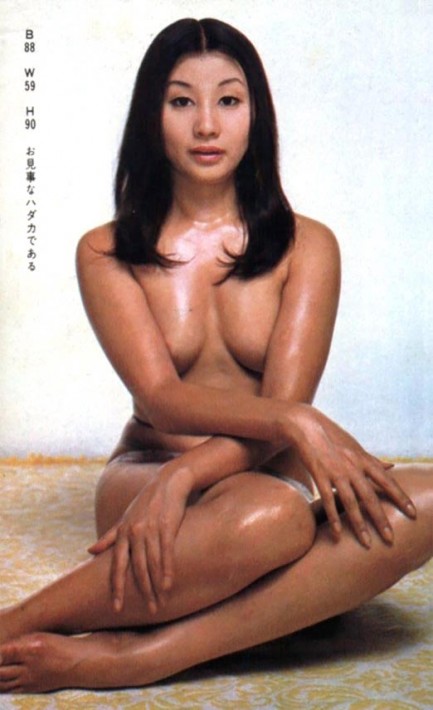 In this game everybody gives their all. 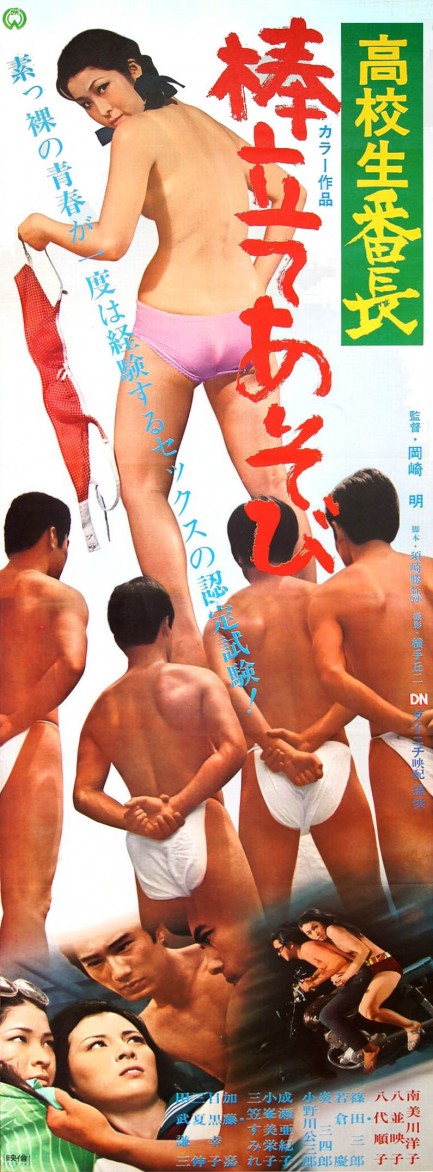
Above, a poster for Kôkôsei banchô: Bôtate asobi, aka The All-Out Game, the second film in the High School Gang Leader franchise. The movie stars Kimisaburo Onogawa, Kei Wakakura, and Saburo Shindo, but Eiko Yanami stars on the poster. Basically, a high school boxing group comes into conflict with a high school judo club thanks to differences between their two leaders, one of whom is a top student and the other of whom is a moron. When we were in high school smart kids couldn't fight but maybe Japan is different. This premiered there today in 1970. See two more posters from the series here and here.
 She's as cool as the other side of the pillow. 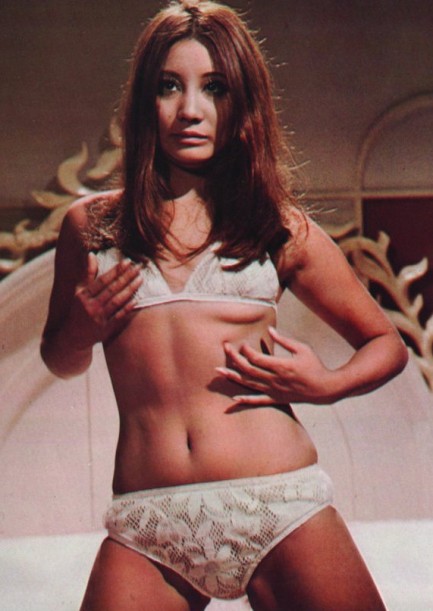 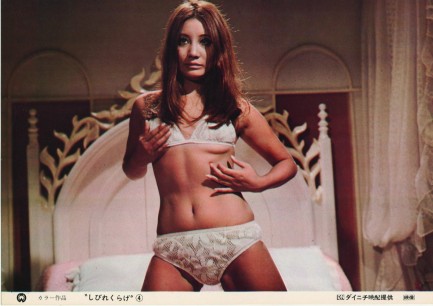
Last year we shared some promo photos from Mari Atsumi's pinku flick Denki kurage, aka Play It Cool, but we held this rarity back for a year because we wanted to give it solo billing. So here you go. The film premiered today in 1970.
 There's nothing not to like about Mari Atsumi. 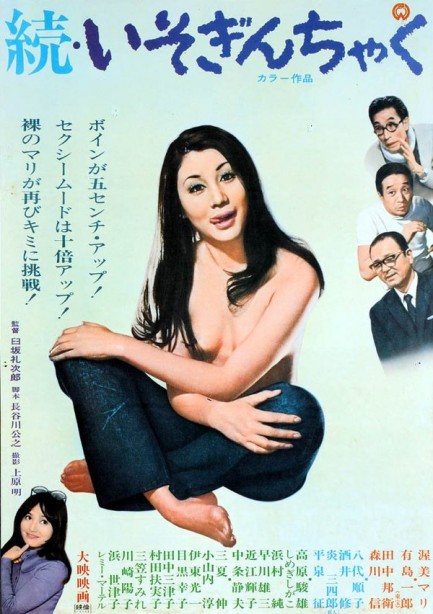
Above is another poster for Zoku Imokinchaku, aka Sea Anemone Girl Continued, starring Mari Atsumi. We shared the tateken sized promo earlier this year, and this is the hansai promo, which we tend to call merely standard sized. The movie premiered in Japan today in 1970, and you can see the other poster here.
 Everybody wants a piece of Mari Atsumi. 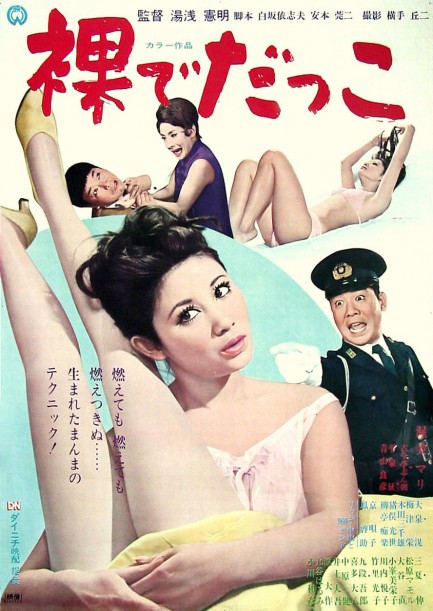
The movie Hadaka de Dakko, aka Be Naked premiered in Japan today in 1970, and as you can see from the promo poster, it starred the prolific Mari Atsumi. She made twenty-six films by our count, which means we've talked about her a lot. Here she plays a snack bar employee who dreams of bigger things, and who, along with her friends, try to accumulate 3 million yen they can use to buy a yacht. The reason it's called Be Naked is because every moneymaking scheme hinges on using Atsumi's body. The beauty shop needs her face to draw customers, the gambling house needs her sex appeal for the same reason, and when she becomes an artist's nude model, well, ditto. And in fact, the same can be said of the movie itself, and we're pretty sure its makers knew it too. Want to see more Atsumi? Start here. 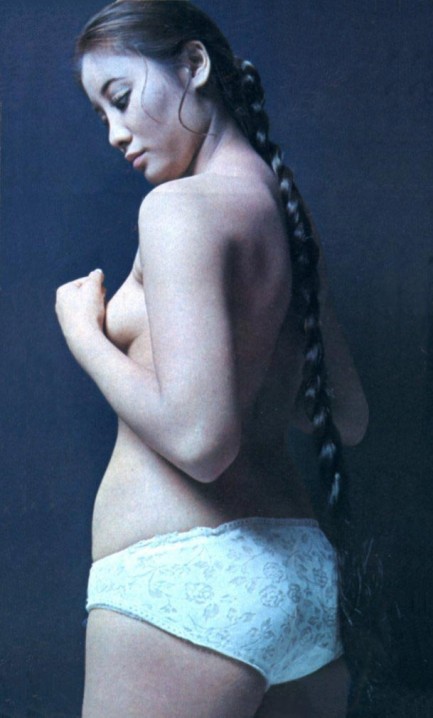
 This is a test of delinquency broadcast system. In the event of a real emergency you'd be royally screwed. 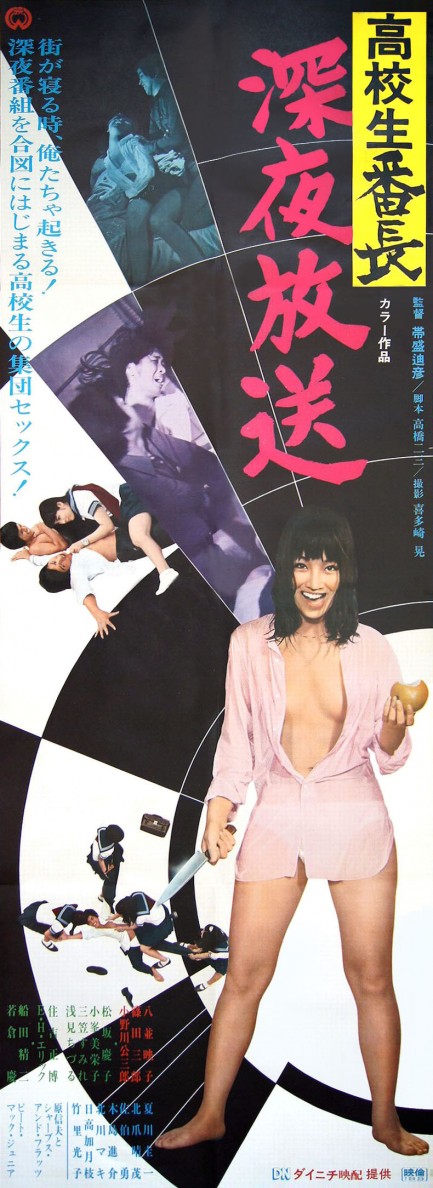
This poster was made to promote the Japanese pinku flick Kôkôsei banchô: Shin'ya hôsô, aka High School Boss 3: Midnight Broadcasting, starring Eiko Yanami and Keiko Matsuzaka. Third in a tetrology, the film is exactly as the title suggests—a tale of delinquency, prostitution, and revenge, with the extra twist of being centered around a radio station. Basically, one of the deejays on the program “All Night Music” reads a letter over the air from a young prostitute, who is later found to have committed suicide while three months pregnant. A search for the people responsible for the tragedy reveals that a prostitution racket is being run out of the local high school. Revenge follows. The tagline for this film is top notch: “When the town goes to bed, we get up!” Kôkôsei banchô: Shin'ya hôsô premiered in Japan today in 1970.
 She was Japan's best sailing actress. 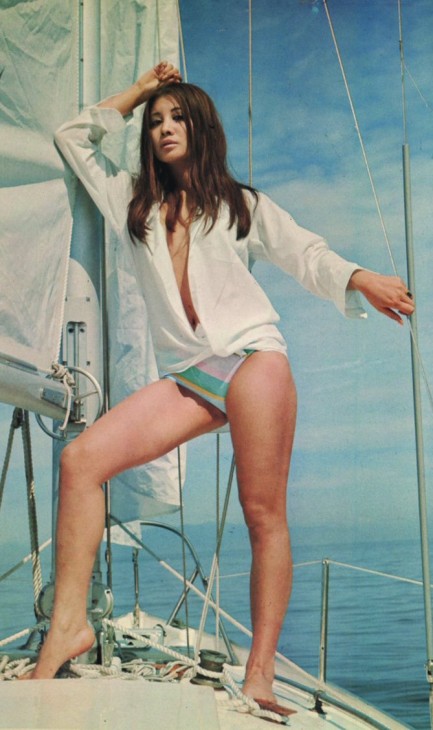
This fantastic sea-themed Daiei Film Co. promo image shows Japanese pinku actress Mari Atsumi, who by now probably needs no introduction. But in case she does, click here to see and read everything we've posted on her. The image comes from her 1970 film Taiyo wa mita, aka I Saw the Sun.
 Go together like hurt and damage. 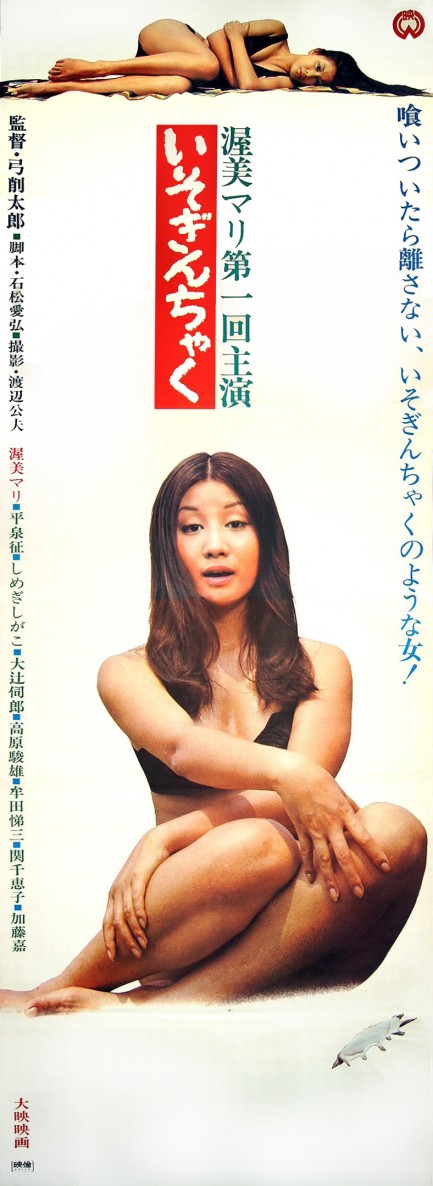 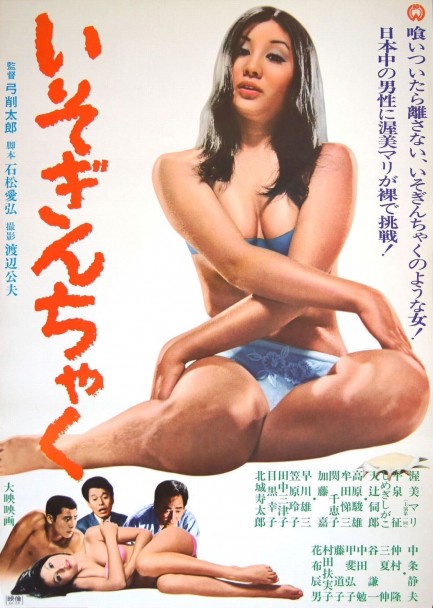
Above, a pair of posters for Imokinchaku, which in English was retitled (we think) Woman Like a Sea Anemone or Sea Anemone Girl. The movie starred Mari Atsumi, Toshio Takahara, and Shimeji Shogako, and it deals with a country girl who arrives in Tokyo, gets a job in a laundry, and becomes embroiled in a series of complications that all begin with a missing pair of panties. One thing these Japanese pinku films do not lack for is weirdness. Audiences certainly responded to this one, despite the fact that it was in black and white, and it spawned a series that in English might be referred to as the “Mollusk Series.” We've already shown you a few posters from the franchise, such as here and here. This one premiered in Japan today in 1969.
 Mari Atsumi shows her stripes. 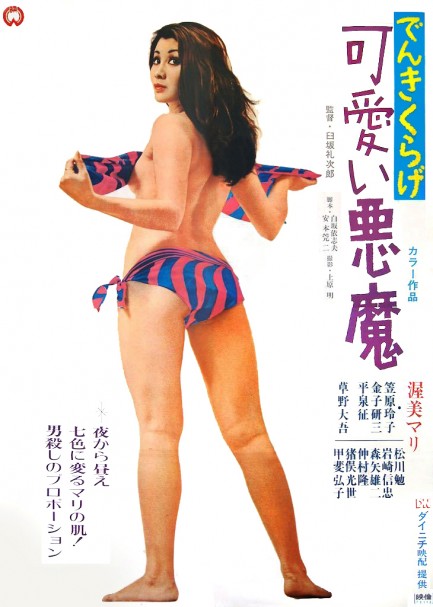
We've already shared two posters for Mari Atsumi's 1970 pinku flick Denki kurage, aka Play It Cool, aka Electric Medusa. Today we have a promo for her film Denki kurage: kawaii akuma, aka The Good Little Bad Girl, with Atsumi looking good, bad, and a few other things, all of them fun. The movie premiered today in 1970. Atsumi was a big star in her day. She appeared in twenty-eight films, guested on a number of television shows, and released a couple of popular albums. Like many pinku actresses, though, her current whereabouts are basically a mystery. One Japanese webpage literally says nobody knows where she is. But that's okay—she gave us plenty to remember her by.
 If anybody can recover the ancestral farm it's Mari. 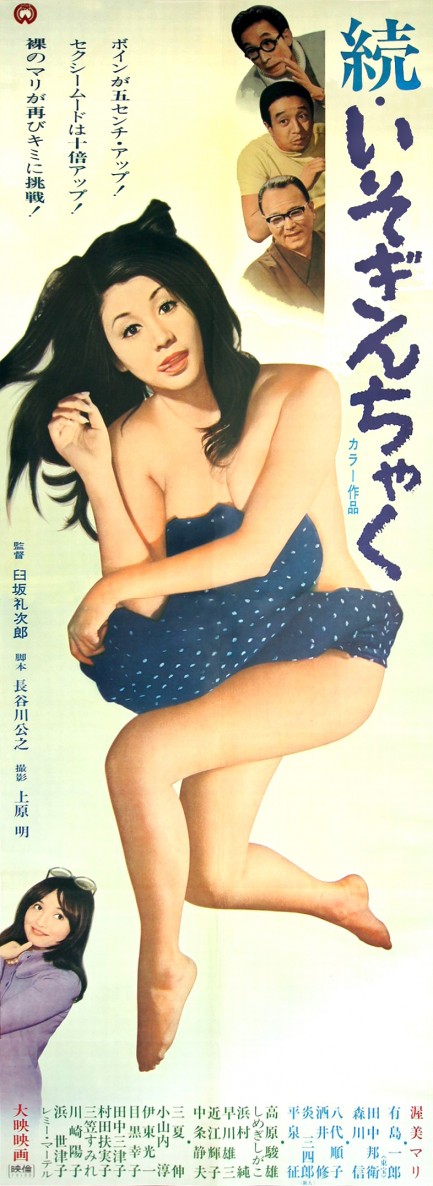
Zoku Imokinchaku*, for which you see the poster above and which premiered in Japan today in 1970, was the sequel to the previous year's Imokinchaku, but shot in color. Atsumi plays a high school girl named Hamako who tries to save enough money to buy her family's ancestral land. Her plan to obtain it through work seems sound enough, but trouble in finances and love, including the theft of her money and a doomed infatuation with a dreamboat who happens to be gay, present serious obstacles. Of course, if the previous film taught Mari anything it was to persevere, and she makes forays into nude modeling and singing in efforts to cobble together a sufficiently large nest egg to buy the land. Do any of these schemes actually work? You'll have to add this one to your queue if you want to find out. On a related note, we learned that Daiei Co. released an Atsumi record in conjunction with this film, and that it also engineered the publication of a photo book. Cross promotion of pinku films was a common tactic back then. In fact, many stars performed live in cinemas between double features, either singing, dancing, or reenacting bits from the films. Japanese law was strict about nudity onscreen, but we've been told these live performances sometimes featured full nudity, which is interesting to contemplate. Atsumi made a lot of public appearances. Below, for example, she's in Shimizu Park in Chiba, where a gaggle of photographers shot pictures of her in her undies. We have images from another Atsumi public appearance we'll share later.
*We can't find a romanized title for this film anywhere, but Zoku Imokinchaku is probably right. It's at least close. If anyone wants to correct us feel free. The official title is 続・いそぎんちゃく.
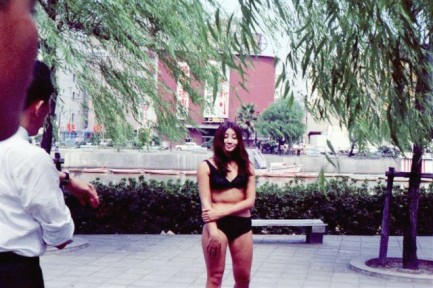  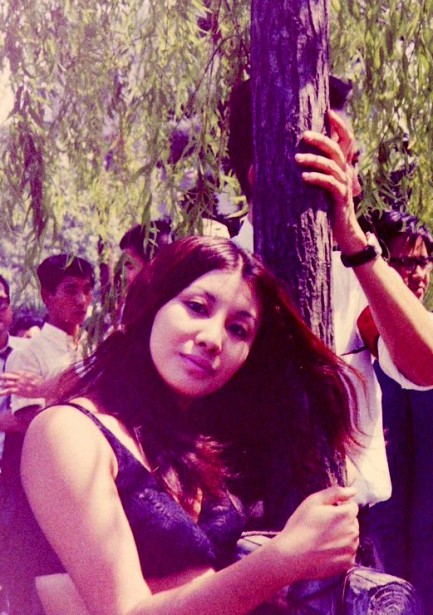
 Motorcycle? I don’t own one. The helmet is for protection when I crash the Pulp guys’ picnic over there. 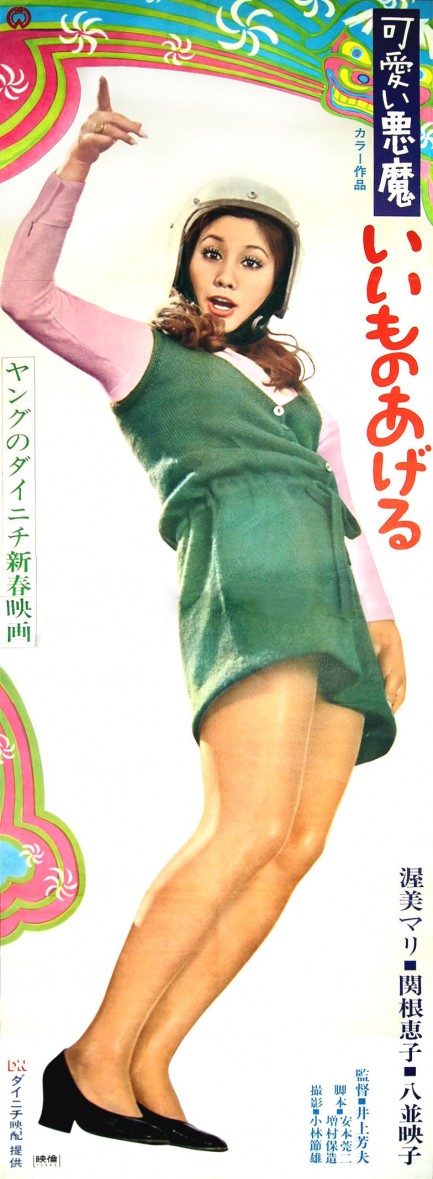
Only a little time today, but we love sharing this Japanese material, so above you see an alternate poster in panel length for Yoshio Inoue’s pinku film Kawaii Akuma: Iimono ageru, aka Just for You, which premiered today in 1970 starring Mari Atsumi. It’s completely different from the standard sized version, which we showed you here, and better too, we think. Now we are off—our holiday involves lobster, crab, and other oceanic yummies eaten picnic style in a hilltop park. Hope your day is excellent.

|
 |

The headlines that mattered yesteryear.
2003—Hope Dies
Film legend Bob Hope dies of pneumonia two months after celebrating his 100th birthday. 1945—Churchill Given the Sack
In spite of admiring Winston Churchill as a great wartime leader, Britons elect
Clement Attlee the nation's new prime minister in a sweeping victory for the Labour Party over the Conservatives. 1952—Evita Peron Dies
Eva Duarte de Peron, aka Evita, wife of the president of the Argentine Republic, dies from cancer at age 33. Evita had brought the working classes into a position of political power never witnessed before, but was hated by the nation's powerful military class. She is lain to rest in Milan, Italy in a secret grave under a nun's name, but is eventually returned to Argentina for reburial beside her husband in 1974. 1943—Mussolini Calls It Quits
Italian dictator Benito Mussolini steps down as head of the armed forces and the government. It soon becomes clear that Il Duce did not relinquish power voluntarily, but was forced to resign after former Fascist colleagues turned against him. He is later installed by Germany as leader of the Italian Social Republic in the north of the country, but is killed by partisans in 1945.
|

|
|

It's easy. We have an uploader that makes it a snap. Use it to submit your art, text, header, and subhead. Your post can be funny, serious, or anything in between, as long as it's vintage pulp. You'll get a byline and experience the fleeting pride of free authorship. We'll edit your post for typos, but the rest is up to you. Click here to give us your best shot.

|
|

















